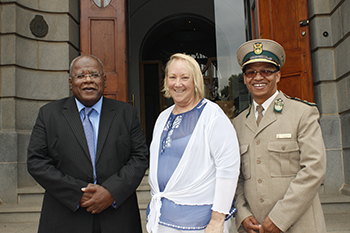Latest News Archive
Please select Category, Year, and then Month to display items
13 August 2024
|
Story Anthony Mthembu
|
Photo Sibahle Dayimani and Amandla Kulu
 Prof Peter Roseel, Managing Director of Management Consulting and Research – a spin-off of the Catholic University of Leuven in Belgium; and Prof Nicolene Barkhuizen, Director of the UFS Business School.
Prof Peter Roseel, Managing Director of Management Consulting and Research – a spin-off of the Catholic University of Leuven in Belgium; and Prof Nicolene Barkhuizen, Director of the UFS Business School.
The Business School at the University of the Free State (UFS) hosted Prof Peter Rosseel, Managing Director of Management Consulting and Research – a spin-off of the Catholic University of Leuven in Belgium – for a guest lecture during his visit to the UFS Faculty of Economic and Management Sciences (EMS).
The guest lecture took place on 19 July 2024 in the Business School Auditorium and was attended by academics from the UFS.
Reflecting on the lecture
The lecture presented by Prof Rosseel focused on how combining strategy, strategy implementation, culture transformation, leadership, and learning successfully leads to sustainable growth, creates engagement, and delivers tangible results. Throughout the lecture, Prof Rosseel spoke about how experts tend to make bad leaders and therefore stop change from happening within an organisation. In fact, he highlighted that, “Experts stop change from happening within the workplace because experts, by definition, look through the eyes of their expertise, but you cannot reduce the world to different forms of expertise, as it is holistic.” As such, he argued that to change an organisation, one must see things from the point of view of others.
Furthermore, Prof Rosseel delved deeper into the hierarchical operating model within organisations. He indicated that the above model should be one community within organisations; however, unfortunately it is not. This is because organisations are made up of several departments such as finance and human resources. As such, he regards these departments to be silos that could prove to be detrimental to organisations, as each silo can create its own culture as opposed to an organisational culture. These are some of the points he discussed throughout the lecture.
After the lecture concluded, the audience had the opportunity to engage with Prof Rosseel on his viewpoints. In fact, Lyle Markham, Academic Head of Department and Lecturer in Industrial Psychology at the UFS, was one of the audience members and described the lecture as insightful.
UFS Postgraduate student council’s community project a success
2016-03-03

Prof Jansen Vice-Chancellor and Rector, Dr Henriette van den Berg, Director of Postgraduate School, and Mr Gustav Wilson, Regional Head: Development and Care, Free State and Northern Cape Region. |
The University of the Free State’s Postgraduate Student Council embarked on a courageous community engagement project for Mandela Day in 2015. The programme was aimed at assisting offenders at Tswelopele Correctional Centre pass their matric exams, thus granting them access to tertiary education.
The Postgraduate Student Council assisted the 2015 matriculants with study support, and motivated them during their final examinations in 2015. The council will play a bigger role this year by offering offenders at Tswelopele career advice and career guidance for when they leave the correctional facility, as well as study techniques to assist them throughout the year, to ensure a 100% pass mark in 2016.
Offenders who had participated in the Postgraduate Student Council project attended the Postgraduate School’s Open Day on 19 February. Of the 12 offenders, 11 passed their matric exams, while one is currently busy with his supplementary exams. Tswelopele has a 92% pass rate; it is the best performing correctional centre in South Africa.
The Tswelopele Correctional Centre also serves as a full-time high school (Grade 10-12), and TVET College, assisting offenders to register for tertiary education through various universities.
Prof Jonathan Jansen, Vice-Chancellor and Rector of the University of the Free State, said that he was immensely proud of the matriculants from Tswelopele Correctional Centre. He added that it is vital for every human being to receive a second chance. “Rehabilitation programmes are meant to give offenders a second chance at life, because we cannot give up on humanity. Correctional centres and rehabilitation centres are a societal responsibility. Society must not give up on offenders, everyone deserves a second chance, and we cannot give up on humanity.”
“To our offenders going through rehabilitation and all our young people who are our hope for the future of our beloved country, be encouraged. Dream again. Discover the wonder in your lives,” said Mr Gustav Wilson, Regional Head: Development and Care, Free State and Northern Cape Region.